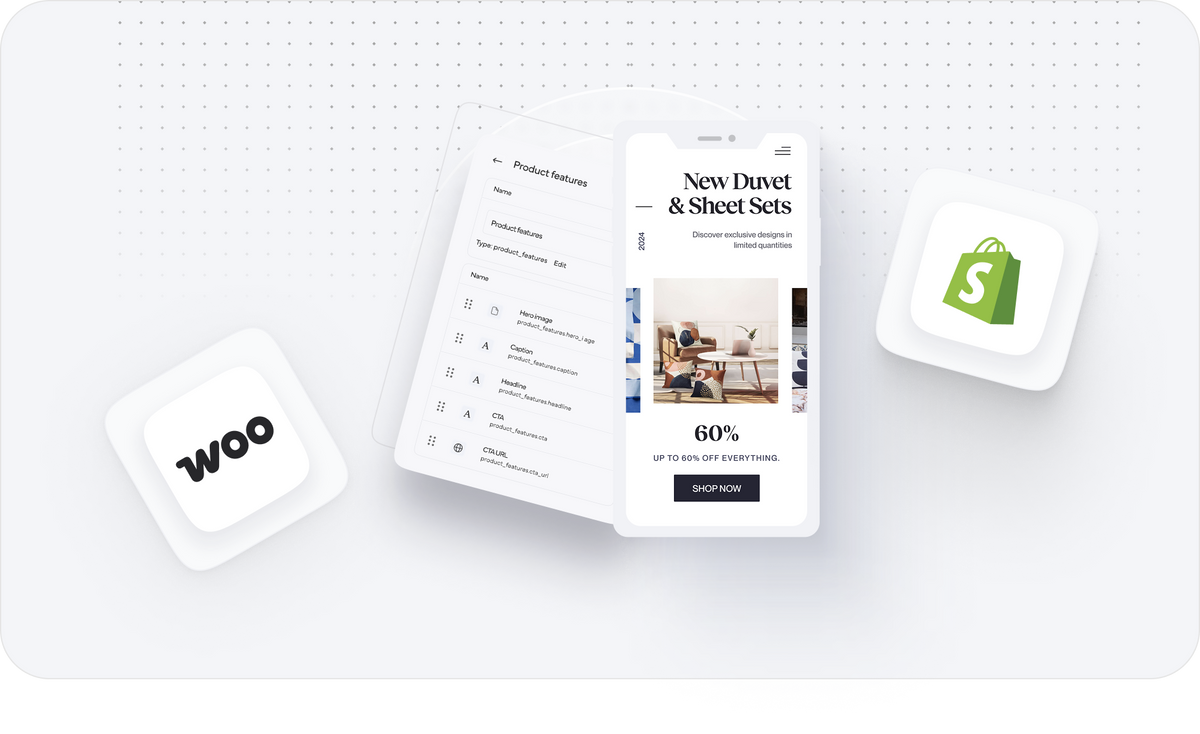Which Platform is Right for you?
WooCommerce vs Shopify
Choosing between WooCommerce and Shopify depends on your business needs, technical expertise, and growth plans. Here's a side-by-side comparison to help you decide.
Schedule a Call
Which Platform is Right for You?
Choosing the right eCommerce platform is one of the most critical decisions for your business’s growth. Both WooCommerce and Shopify are powerful platforms, but they cater to different needs, technical skill levels, and growth goals. In this comprehensive comparison, we break down the key features of WooCommerce and Shopify to help you make an informed decision.
| Ease of Use | WooCommerce | Shopify |
|---|---|---|
| Hosting & Security | Requires familiarity with WordPress. Setup, plugin management, and updates need technical involvement. | User-friendly, drag-and-drop interface. No coding or WordPress experience required. |
| Hosting & Security | Self-hosted. You manage hosting, SSL certificates, bookups, and security updates separately. | Fully hosted. Shopify handles hosting, security patches, bookups, and PCI compliance for you. |
| Hosting & Security | Self-hosted. You manage hosting, SSL certificates, bookups, and security updates separately. | Fully hosted. Shopify handles hosting, security patches, bookups, and PCI compliance for you. |
| Scalability | Highly flexible but needs constant optimization as your traffic grows. May require dedicated servers. | Seamlessly scalable. Shopify infrastructure supports startups to enterprise without extra effort. |
| Customization & Flexibility | Open-source with endless customization options. Advanced customizations may require developers. | Customizable via Shopify themes and apps. More structured but straightforward customization. |
| App Ecosystem | Thousands of WordPress plugins. Some may conflict or require manual updates. | Curated Shopify App Store with reliable, vetted apps that integrate smoothly. |
| Customer Support | Community forums, documentation. Direct support depends on hosting provider or plugin developers. | 24/7 dedicated Shopify support (chat, phone, email) • extensive help center. |
| Analytics & Reporting | Basic reporting tools. Advanced analytics require additional plugins like Google Analytics Integration. | Built-in, advanced sales & customer behavior analytics. Integrates easily with Google & Facebook. |
| Costs | Free plugin. Additional costs for hosting, premium plugins, security, and developer support. | Monthly subscription with predictable pricing, includes hosting, security, and basic functionality |
Deep Dive
Key Considerations
1
Ease of Use
Deep Dive
Ease of Use
WooCommerce: Requires familiarity with WordPress, hosting, and plugins. More flexibility but a steeper learning curve.
Shopify: User-friendly with an intuitive interface. Best for beginners and those who want a hassle-free setup.

2
Hosting & Security
Deep Dive
Hosting & Security
WooCommerce: Self-hosted, meaning you need to manage security, backups, and performance optimization yourself.
Shopify: Fully hosted with built-in security, SSL, and automatic updates, reducing maintenance concerns.

3
Scalability
Deep Dive
Scalability
WooCommerce: Highly scalable but depends on your hosting provider and technical optimizations.
Shopify: Scales easily with built-in infrastructure, handling high traffic without extra configuration.

4
Customisation & Flexibility
Deep Dive
Customisation & Flexibility
WooCommerce: Open-source, allowing unlimited customization via themes, plugins, and custom code.
Shopify: Customizable but limited by Shopify’s platform constraints. Requires Liquid for advanced changes.

5
App & Plugin Ecosystem
Deep Dive
App & Plugin Ecosystem
WooCommerce: Large library of free and paid plugins, but compatibility issues may arise between different plugins.
Shopify: Extensive app store with seamless integrations, but many advanced apps come with recurring costs.

6
Customer Support
Deep Dive
Customer Support
WooCommerce: No official support; relies on community forums, third-party developers, or paid support services.
Shopify: 24/7 customer support via chat, email, and phone, making troubleshooting easier.

7
Analytics & Reporting
Deep Dive
Analytics & Reporting
WooCommerce: Requires third-party plugins or Google Analytics for in-depth reporting.
Shopify: Built-in analytics and reports with advanced insights available in higher-tier plans.

8
Total Cost of Ownership
Deep Dive
Total Cost of Ownership
WooCommerce: Lower initial costs but variable expenses for hosting, themes, plugins, and maintenance.
Shopify: Predictable monthly costs but additional fees for premium apps and transaction fees unless using Shopify Payments.

Ease of Use
WooCommerce: Requires familiarity with WordPress, hosting, and plugins. More flexibility but a steeper learning curve.
Shopify: User-friendly with an intuitive interface. Best for beginners and those who want a hassle-free setup.

Hosting & Security
WooCommerce: Self-hosted, meaning you need to manage security, backups, and performance optimization yourself.
Shopify: Fully hosted with built-in security, SSL, and automatic updates, reducing maintenance concerns.

Scalability
WooCommerce: Highly scalable but depends on your hosting provider and technical optimizations.
Shopify: Scales easily with built-in infrastructure, handling high traffic without extra configuration.

Customisation & Flexibility
WooCommerce: Open-source, allowing unlimited customization via themes, plugins, and custom code.
Shopify: Customizable but limited by Shopify’s platform constraints. Requires Liquid for advanced changes.

App & Plugin Ecosystem
WooCommerce: Large library of free and paid plugins, but compatibility issues may arise between different plugins.
Shopify: Extensive app store with seamless integrations, but many advanced apps come with recurring costs.

Customer Support
WooCommerce: No official support; relies on community forums, third-party developers, or paid support services.
Shopify: 24/7 customer support via chat, email, and phone, making troubleshooting easier.

Analytics & Reporting
WooCommerce: Requires third-party plugins or Google Analytics for in-depth reporting.
Shopify: Built-in analytics and reports with advanced insights available in higher-tier plans.

Total Cost of Ownership
WooCommerce: Lower initial costs but variable expenses for hosting, themes, plugins, and maintenance.
Shopify: Predictable monthly costs but additional fees for premium apps and transaction fees unless using Shopify Payments.

Pros & Cons Overview
| WooCommerce Pros | WooCommerce Cons |
|---|---|
| Highly flexible & customizable | Requires WordPress & technical knowledge |
| Complete control over hosting & data | Hosting, backups, and security are manual |
| Large open-source community support | Plugin conflict & maintenance can be time-consuming |
| Lower upfront costs | Long-term costs for hosting & development can grow |
| WooCommerce Pros | WooCommerce Cons |
|---|---|
| Highly flexible & customizable | Requires WordPress & technical knowledge |
| Complete control over hosting & data | Hosting, backups, and security are manual |
| Large open-source community support | Plugin conflict & maintenance can be time-consuming |
| Lower upfront costs | Long-term costs for hosting & development can grow |
Step by Step /
WooCommerce to Shopify Complete Guide
Our WooCommerce to Shopify Complete Guide provides a clear, step-by-step roadmap to help you seamlessly transition your store without disruptions
Migration Guide
Trusted by 1000+ innovative companies worldwide
